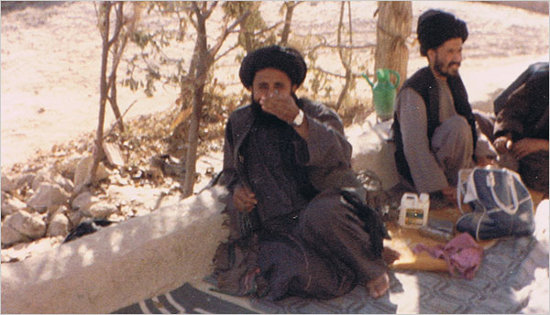 |
|
An old photograph of Mullah Abdul Ghani Baradar, the former leader of the Quetta Shura who was detained in Karachi. Image from The New York Times. |
On Sept. 10, the Pakistani government announced that it would soon free Mullah Baradar, the former deputy to Taliban emir Mullah Omar. Today, the Pakistanis made good, and freed Baradar, under the guise of furthering peace talks. Afghanistan’s High Peace Council, which has also pushed for the release of Taliban leaders, including five high-ranking commanders who are closely tied to al Qaeda and are currently being held at Guantanamo Bay, is also ecstatic over Baradar’s release. From Dawn:
“Yes Baradar has been released,” Omar Hamid, a spokesman for Pakistan’s interior ministry told news agency AFP, without elaborating on the circumstances of the release.
The Pakistani foreign office also confirmed the release in a short statement.
“Mullah Baradar was released this morning,” Aizaz Ahmad Chaudhry, the spokesman for foreign ministry, told AFP via text message. He added: “Released in Pakistan. No further details available with me”.
Afghanistan’s High Peace Council (HPC) welcomed the release and thanked Pakistan’s government.
“We welcome his release. And we thank the government of Pakistan that showed goodwill and answered positively to the request of Afghanistan government,” Mohammad Esmail Qasimyar, senior member of HPC, told AFP.
“Baradar is someone who has always been eager to join peace negotiations, and we hope he joins peace talks soon. We are optimistic about it, he is still an influential figure, and the Taliban still respect him,” Qasimyar said.
Pakistan’s foreign office on Friday said that Baradar’s release would facilitate Afghanistan’s reconciliation process with the Taliban as a Nato combat mission there winds down.
While many are hailing Baradar’s release as a big step towards a negotiated settlement with the Taliban, keep in mind that the US, NATO, and the Afghan government have been duped by the Taliban over negotiations numerous times in the past. Take for instance the Taliban’s office in Qatar, which was a major propaganda coup for the terrorist group. The West hoped the office would be used to further negotiations, while the Taliban said it would be used as a political office to legitimize the group. The Taliban raised their flag and called the Qatar mission the “Political Office of the Islamic Emirates of Afghanistan.”
And remember when the US unwittingly paid an impostor who pretended to be Mullah Akhtar Mohammed Mansour, the co-leader of the Taliban’s executive shura, in hopes that he could bring the Taliban to the negotiating table? The impostor received “a sizable sum of money to take part in the talks” with NATO officials; he told them what they wanted to hear and walked away with his cash.
Numerous Taliban commanders have been freed only to return to the fight against NATO and Afghan forces. Mullah Zakir is the most prominent; Maulawi Ghulam Mohammad is merely the most recent.
If you are expecting Baradar to serve as a magic bullet to bring the Taliban to the table, be prepared to be disappointed. At every turn, the Taliban have outmaneuvered Western officials desperate for a political settlement, using negotiations as a ploy to have the group’s profile raised and key commanders released. The Taliban have been clear all along that they refuse to recognize the Afghan government and the current constitution, and that they will not denounce al Qaeda, let alone turn in leaders and operatives they work with on a daily basis.
Are you a dedicated reader of FDD's Long War Journal? Has our research benefitted you or your team over the years? Support our independent reporting and analysis today by considering a one-time or monthly donation. Thanks for reading! You can make a tax-deductible donation here.








2 Comments
This is exactly why I like the LWJ. You don’t mince words. I just wish it didn’t fall on deaf ears by the policy makers. Anyone who has followed this conflict knows that releasing baradar will not end up good in our favor. Keep up the great work Bill. thanks
That last paragraph should be at the top of every article regarding the Taliban. Like the bismillah, it just should start right at the top of articles.
@jay You are so right sir. The clear sighted view of this website is prescient to today’s highly politicized environment. Getting information free of political hyperbole and miss-characterizations of policy/positions is so badly needed.
I want to avoid using the “breath of fresh air” cliche here.
Offered for example—
Once again I would refer people to this websites article on Benghazi dated Sept 12, 2011 The very day after the attack. look how clear and accurate the information is. It makes what happened in the media during the next year, in fact right to this very day look just plain silly. especially in light of all the article related to Benghazi that were posted here since then
https://www.longwarjournal.org/threat-matrix/archives/2012/09/ansar_al_shariah_issues_statem.php
Also search on the LJW search engine- ‘Nasr city’ and look at all the Benghazi related information very few other websites were even interested in reporting.I never once heard it on the news and I watch a lot
We cannot be the only ones jay.
Long Live the Long War Journal and may it eventually run out of stories to report.